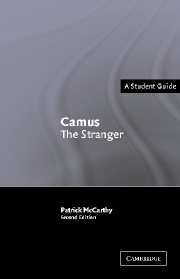5 - Why and how we read The Stranger: a guide to further reading
Published online by Cambridge University Press: 05 June 2012
Summary
Contemporaries, precursors and followers
Sartre's article on The Stranger helped to make Camus famous, and also to impose a reading of the novel which has remained the dominant reading. In this he was flanked by Blanchot and Barthes, who contributed towards establishing The Stranger as the novel of the absurd.
Sartre, whose essay was first published in Les Cahiers du Sud in February 1943, stated, as clearly as censorship would allow, the book's meaning to Occupation readers: ‘Amidst the literary production of the time this novel was itself a stranger’ (J.-P. Sartre, ‘Explication de L'Etranger’, Situations, vol. 1 (Paris: Gallimard, 1947), p. 99). Whereas the official culture of Vichy castigated the Third Republic, wept over France's shame and encouraged conformity to the new order, The Stranger offered a discourse that stood outside the control of others. The absurd was a refutation of the fictions offered by the Vichy government.
Like Sartre, Blanchot understood that the novel's first quality was a refusal and that Meursault's indifference was a critical, negative force. ‘We enter the characters’ souls while ignoring the nature of their feelings and thoughts', writes Blanchot, ‘this book undermines the concept of subject’ (Maurice Blanchot, Faux Pas (Paris: Gallimard, 1943), p. 249). Blanchot does not approach the work as joyously as Sartre. He detects in it something of his own anguish – an anguish that is, in his view, too easily banished in The Myth.
- Type
- Chapter
- Information
- Camus: The Stranger , pp. 96 - 109Publisher: Cambridge University PressPrint publication year: 2004



